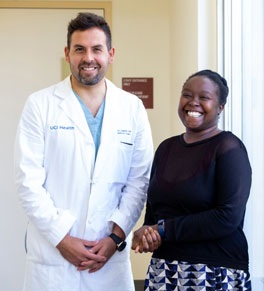Patient breathes new life with ECMO device

An asthma attack turned almost deadly for 31-year-old Freda Kyalo.
Being short of breath was common for the Santa Ana woman, who has suffered from asthma since she was 10 years old. But on Oct. 5, 2019, Kyala’s difficult breaths might have been her last — if not for a new treatment device offered at UCI Medical Center, extracorporeal membrane oxygenation (ECMO).
"There was no way Freda was going to survive without the use of ECMO," says UCI Health cardiothoracic surgeon Dr. Fabio Sagebin, who performed the hospital’s first ECMO procedure on Kyalo.
Asthma treatment failing
Initially, Kyalo wasn’t concerned about her breathing difficulties. But her condition quickly deteriorated. The usual treatments for her shortness of breath, wheezing and coughing were not working and she was feeling increasingly lethargic.
Living with asthma had taught Kyalo how to keep calm: “Panicking is a waste of energy. You can’t spend the energy you need to survive on worrying.” Instead, she took action.
She went to a nearby urgent care, where they advised her to go to an emergency department. Rather than go to an ED two minutes from her Santa Ana home, she went directly to the ED recommended by the urgent care staff: UCI Medical Center, because of the specialized care and resources available.
“I am definitely lucky to be alive; the only other option was death,” says Kyalo.
Waking up in the ICU
On the drive over, her boyfriend, Robert Kirchhan, noticed she was starting to turn “a little blue.” When they arrived at the medical center in Orange, Kyalo was so weak she couldn’t walk from the parking lot to the ER and needed a wheelchair.
Emergency services staff recognized her labored breathing and immediately began administering tests. “They tried everything. Nothing worked,” Kyalo says.
She was placed on a ventilator to assist her breathing but her condition continued to deteriorate. With her lungs unable to work, her only other option was ECMO, a portable heart-lung machine similar to the larger machines hospitals use for open-heart surgical procedures.
"The next thing I remember, I woke up in the ICU with an IV attached,” says Kyalo. “I didn’t know how long I had been there. I was so confused about time.”
Parents gave consent
Kyalo had been unconscious for five days.
It was Kyalo’s mother, a registered nurse, and stepfather, a respiratory therapist, who gave consent for Kyalo to have the ECMO procedure.
“I’m glad my family made the right decision at the time,” she says. “They knew the risks and made the decision. They didn’t hesitate at all.”
How ECMO works
ECMO is a procedure used in severe cases. It works as a replacement heart and lungs. Blood is pumped out of the body through a vein in one leg. The blood runs through an oxygenator to infuse it with oxygen before being pumped back into the body through a vein in the other leg.
Using ECMO allows a patient’s heart and lungs to rest while physicians treat the underlying condition or disease. Most ECMO patients are patients ages 50 to 70 and suffering with advanced heart failure, according to Sagebin. Often, they have severe, life-threatening conditions and are waiting for organ transplants.
In Kyalo’s case, because her lungs were failing, the initial carbon-dioxide level in her blood was dangerously high at 180. Normal is 30-50. Her blood oxygenation level was about 56%, but it wasn’t getting into her bloodstream.
Within a few hours on ECMO, her carbon-dioxide levels dropped by half and her oxygenation normalized to about 95% to 100%.
“Dr. Sagebin has been amazing,” she says. “I’m blessed. I wouldn’t be here if it wasn’t for him.”
Kyalo hasn’t shared her experience with many people because, she says, “I wasn’t ready to deal with it.”
But she wants other people to know about ECMO as a life-saving option in Orange County. “What happened to me can happen to anyone,” Kyalo adds.
With her physical healing is nearly complete, she says her life is getting back to normal. “I’m feeling about 85%, and I can walk pretty far now. I’m getting better by the week.”
Her near-death experience has changed Kyalo and illuminated the need for balance in all areas of her life. “Stress is a big trigger for asthma,” she says. “I know I need to take care of myself, to make myself a priority.”
Kyalo is looking forward to traveling and even skydiving very soon. And she’ll be breathing easily at any altitude.
Explore further
Browse more blog posts by topic.




